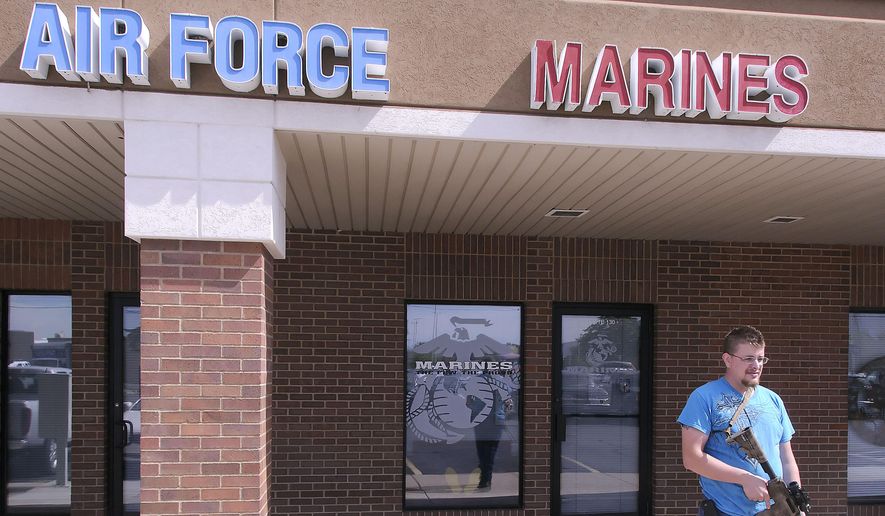Capitol Hill Republicans are pushing to arm service members at recruitment centers in the wake of the deadly Chattanooga, Tennessee, attack, but a “patchwork” of laws may get in the way.
While federal law gives the secretaries of the various armed forces the power to arm military employees if there’s a threat to a particular military base, most recruitment centers are located in malls or in public places — not federal land — and it’s unclear if the law applies to recruiters or reservists.
In these commercially leased spaces, state and local laws need to be followed, and they may not allow for guns, said Joe Kasper, a spokesman for Rep. Duncan Hunter, California Republican.
Mr. Hunter and Sen. Steve Daines, Montana Republican, intend to clarify the law to ensure secretaries can grant permission to arm reservists and recruiters with a case-by-case special authorization.
“As much as we would like to say you have to arm all these guys, it’s too problematic through the huge patchwork of state and local laws, and that creates a huge patchwork of complications,” Mr. Kasper said. “You’d run into problems, and it would be in their interest to have their authorization from Congress.”
Robert Taylor, the founder of Security Services International Associates, said arming the recruiters could make “a soft target into a harder one,” he said.
“If I knew I was going to be up against some well-armed and trained guys, [I’d] think of a different tactic,” Mr. Taylor said. “Having a well-trained person counterattack immediately will reduce deaths considerably.”
But the bill’s language raised some concern for Mike McLively, an attorney for the Law Center to Prevent Gun Violence. He says the wording requires at least one officer at recruitment centers to be armed instead of giving the secretaries the power to grant arms.
The Pentagon has made no comment on specific laws proposed since Muhammad Youssef Abdulazeez, 24, of Hixson, Tennessee, unleashed a barrage of fire at a recruiting center in Chattanooga, killing four Marines and injuring three others. Pentagon Press Secretary Peter Cook released a statement Friday saying that changes to the Pentagon’s policies are under advisement.
Sen. Jerry Moran, Kansas Republican, has proposed arming all recruiters.
“Rather than asking for permission to allow service members to bear arms, Sen. Moran’s bill makes the right of servicemen and -women to carry the default, not the exception,” said Garrette Turner, a spokesperson for Mr. Moran.
The Pentagon’s ban on arming servicemen on U.S. bases is largely due to legal issues, such as the Posse Comitatus Act of 1878, which prohibits the federal government from using the military for domestic law enforcement. U.S. forces don’t routinely carry guns when they are not in combat or on military bases. And Pentagon officials are sensitive to any appearance of armed troops within the United States.
Ben Connable, a policy analyst at RAND Corporation, said the best way to keep guns in recruiting centers would be to lock up the weapon and use biometrics to secure it from theft and misplacement. The military would have to create a foolproof plan in order to implement this, he said.
“Many of them are not infantrymen with extensive experience,” Mr. Connable said. “You don’t have time to keep weapons skills up. A lot of recruiters are stationed in areas without ranges. So keeping their skills up is a big thing the military will have to address.”
Mr. Taylor said training would be paramount in implementing the law in a safe manner.
“I’ve seen special force operators do 25 years in a bodyguard team and shoot themselves in the leg, and these are guys who practice at the range once a week,” he said. “Accidents happen. So there’s all sorts of safety concerns. [Also], do they incur the cost of bullet-proofing storefronts?”
Defense Secretary Ashton Carter has asked the military services to determine if additional steps can be taken to ensure people are safe at military installations.
While Republicans are pushing to arm recruiters, President Obama is pushing to ban Social Security beneficiaries from owning guns if they lack the mental capacity to manage their own disability payments. The National Rifle Association said the proposal was “the largest gun grab in American history.”
The question of whether to arm recruiters is “incredibly legally complex,” Mr. McLively said.
“With an increased number of attacks on these facilities, under certain circumstances, it’s appropriate to arm people,” Mr. McLively said. “But that should be a decision made by the military and not mandated by Congress.”
• Anjali Shastry can be reached at ashastry@washingtontimes.com.




Please read our comment policy before commenting.